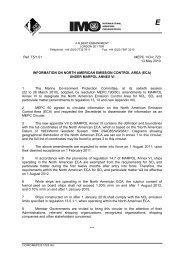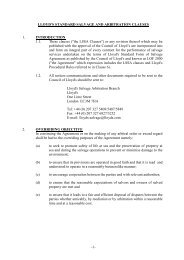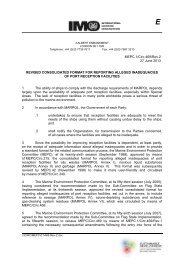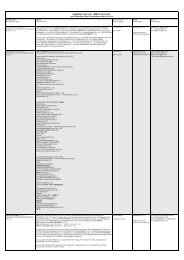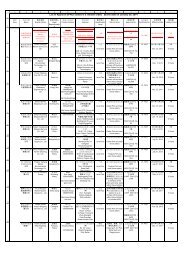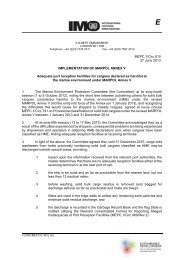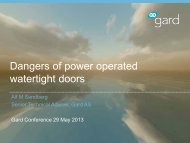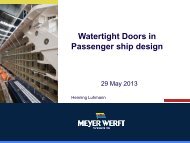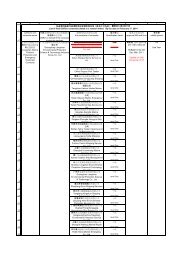PIRACY – Questions & Answers - Gard
PIRACY – Questions & Answers - Gard
PIRACY – Questions & Answers - Gard
Create successful ePaper yourself
Turn your PDF publications into a flip-book with our unique Google optimized e-Paper software.
<strong>PIRACY</strong> <strong>–</strong> <strong>Questions</strong> & <strong>Answers</strong>Like all Clubs and other insurance providers, <strong>Gard</strong> has received and continues toreceive many and different questions concerning piracy, principally off the coastof Somalia and in the Indian Ocean and the Gulf of Aden, from clients andmembers. While no two cases are identical and each case must be assessed onits own facts, we set out below some of most frequently asked questions and theanswers we have given.Q1: What is being done to reduce the risk of piracy in the Gulf of Adenand off the coast of Somalia?A1Two resolutions passed by the UN Security Council (Resolutions 1816 and1838) have empowered foreign naval and other military forces to suppresspiracy in the Gulf of Aden, including within Somali territorial waters. Multinationalnavy forces have been allocated to this task. An InternationallyRecognised Transit Corridor (“IRTC”) has been established in the Gulf ofAden. This area is patrolled by warships from the Coalition of variouscountries and from other countries, all of whom have sent naval assets tothe region. In addition, a number of states have offered the services onboard merchant vessels of armed Navy personnel. It should be notedthat the contractual terms on which such offers have been made are oftenheavily weighted in favor of the state and against the shipowner. Suchterms, principally those offered by the French Navy, have been found notto meet the International Group’s minimum contractual requirements (seealso Q & A 4).In March 2012, the European Union agreed to expand its mission againstSomali pirates by allowing military forces to attack land targets as well asthose at sea. In a two-year extension of its mission, EU defence ministersagreed warships could target boats and fuel dumps. At that time, up to10 EU naval ships were currently on patrol off the Horn of Africa. Theextension means they will stay until at least December 2014.Numerous private security companies have also offered their services toowners and operators. <strong>Gard</strong> will, upon request, review draft contractswith PCASP (Privately Contracted Armed Security Personnel) to ensurethey comply with any cover(s) afforded by <strong>Gard</strong> to a client or member.However, in spite of these measures, the risk of pirate attacks andhijackings remains high, especially in the Indian Ocean. The pirates haveshown themselves to be capable of adapting their operations in responseto steps taken by naval forces and merchant vessels. Additionally, thelevel and method of response to piracy incidents/attacks varies among theinternational forces.The Norwegian Shipowners’ Association recommends owners to notify theNorwegian Maritime Directorate and the UK Maritime Trade operationsbefore passing through the Gulf of Aden.Their contact details are:<strong>Gard</strong> AS <strong>–</strong> Piracy Q&A 1
Norwegian Maritime DirectorateTelephone: +47 52 74 5000E-mail: security@sjofartsdir.noUK Maritime Trade Operations (Dubai)Telephone: +971 50 552 3125E-mail (preferred): ukmtodubai@eim.aeThe Maritime Security Centre, Horn of Africa (MSCHOA) provides valuableinformation and assistance, as well as being the appropriateregistration/reporting location under the BMPs. Their website ishttp://www.mschoa.org/Pages/default.aspxIn early October 2011, NATO issued an updated Pirate Attack Group(“PAG”) map. This can be found at:http://www.shipping.nato.int/operations/OS/Pages/PAGmap.aspxThe NATO Shipping Centre (based at Northwood, UK) is able to provideclients and members with wide-ranging operational information. Thisinformation is updated regularly, in some cases, several times a day.Members and clients may contact the Shipping Centre directly for suchinformation at:Web: www.shipping.nato.intE-mail: info@shipping.nato.intPhone: +44 (0)1923 956574Fax: +44 (0)1923 956575Incidents of piracy should be reported to the International MaritimeBureau, Kuala Lumpur:Telephone: +603 2031 0014E-mail: imbkl@icc-ccs.orgQ2: What is the scope of P&I cover for loss, damage or injury causedby pirates?A2: Piracy may be considered a marine risk or a war risk depending on theterms and conditions of the war risk insurances for the ship. Forexample, under English conditions (ITC), “piracy” has traditionally beentreated as a marine risk, although more and more insurers now seek toexclude piracy from the standard hull and machinery cover and treat it asa war risk. Under Norwegian conditions, however (Norwegian MarineInsurance Plan (“NMIP”)), “piracy” is treated as a war risk. If it is a warrisk, the P&I cover will be subsidiary to the war risk cover. See <strong>Gard</strong> Rule71. If it is a marine risk, the standard scope of cover is available under theP&I insurance. For example, cover is available for the shipowner’s liabilityfor injury or death to crew members as a consequence of a pirate attackon the ship, as well as for the shipowner’s legal liability to cargo ownersfor loss or damage to cargo. See also comments in the <strong>Gard</strong> Guidance tothe Statutes and Rules, page 334 and <strong>Gard</strong> News Issue 192, pages 30 <strong>–</strong>32.<strong>Gard</strong> AS <strong>–</strong> Piracy Q&A 2
private security guards to being “neutral”. <strong>Gard</strong>’s position has also beenchanged to neutral. A relatively small number of States have enactedlegislation which expressly permits the employment on board of armedguards.Ultimately, though, the type and scope of safety precautions is anoperational issue that each shipowner must consider and decide, given thetype of ship, cargo and trade. <strong>Gard</strong> remains of the view that havingarmed private security guards on board does not, by itself, prejudice theowner’s insurance cover with <strong>Gard</strong>, whether P&I, H&M, LOH or War H&M.Members and clients are reminded that they should contact their FlagState to ensure that the employment of private armed guards and/or theuse of armed force by such guards against pirates is not prohibited underthe Flag State regulations and would not otherwise represent a breach ofany statutory provisions of the Flag State. <strong>Gard</strong>’s Rule 8.1.f. may berelevant here. <strong>Gard</strong> reserves the right to change its view if it is at oddswith that of co-insurers, reinsurers or other parties. It should also benoted that the terms of the contracts offered to shipowners by a numberof States with naval assets in the region in exchange for them providingarmed service personnel to serve as guards on board ships havepreviously been found to fall outside standard International Group coverand thus were also outside Club cover. A special cover in relation to this0contract has been arranged by Miller Insurance Brokers. <strong>Gard</strong>’sunderwriting department can assist in arranging such special cover.On a practical level, members and clients should refer to the IndustryGuidance on the Selection of Privately Contracted Armed SecurityPersonnel (“PCASP”), approved by the IMO and updated in May 2012. Therevised MSC.1-Circ.1405-Rev.2 dated 25/5/12 and Guidance can be foundat:http://www.imo.org/OurWork/Security/SecDocs/Documents/Piracy/MSC.1-Circ.1405-Rev2.pdfIn addition, all clients and members are strongly recommended to followthe Best Management Practices to deter Piracy in the Gulf of Aden and offthe Coast of Somalia. The current version is version 4 (August 2011).This can be found at:http://www.marisec.org/piracybmp.htmMembers should note that the International Group has advised that “….acausative failure to comply with the BMPs could prejudice a shipowner’sright of recovery particularly in cases where cover is provided on adiscretionary basis.” See paragraph 10 of the Group’s FAQs.Q5: What is <strong>Gard</strong>'s attitude to the employment and presence on boardof unarmed security personnel?A5: In principle, <strong>Gard</strong> has no objection to the employment and presence onboard of unarmed security personnel. Their employment and presence onboard will not, by itself, affect the P & I Cover and normally, they will betreated as "other persons on board" in accordance with Rule 29 of theStatutes & Rules. Ideally, such persons should sign an Indemnity<strong>Gard</strong> AS <strong>–</strong> Piracy Q&A 4
Agreement, the wording of which is available on request, or from the <strong>Gard</strong>website in the “Claims/Instructions/Forms” section. More often, they willbe employed under a contract. <strong>Gard</strong> will evaluate all such contracts toensure they do not impose liabilities on the member which are consideredto be unacceptable and/or outside the scope of the cover.Again, clients and members are strongly recommended to follow the BestManagement Practices to deter Piracy in the Gulf of Aden and off the Coastof Somalia. The current version is version 4 (August 2011). This can befound at:http://www.marisec.org/piracybmp.htmQ6: Does <strong>Gard</strong> recommend or endorse any particular form of contractwith private security companies?A6: In March 2012, BIMCO released the GUARDCON contract. Members arereminded that GUARDCON does not represent a recommendation byBIMCO or <strong>Gard</strong> for, or endorsement of, the use of security guards onboard vessels. Nor are security guards a substitute for strict compliancewith Best Management Practices. Placing security guards on board a vesselshould also only be considered after a risk assessment has been carriedout and the Master should be involved in the decision-making process.However, the provisions of GUARDCON have been reviewed by theInternational Group’s Maritime Security subcommittee and conform withClub cover and Pooling requirements. The use of the GUARDCON contractis, therefore, recommended. Further, provided that the provisions of theGUARDCON contract relevant to P&I cover are materially unchanged, it isnot necessary for clients and members to seek prior approval of such acontract from <strong>Gard</strong>. Clients and members are reminded that all otherdraft contracts should be submitted to <strong>Gard</strong> to ensure they do notprejudice the P&I cover.Q7: Is a ransom payment covered by <strong>Gard</strong>?A7: Under English law, the position is that a ransom payment to pirates (butnot to fund or support terrorism) appears to be regarded as not beingillegal and to be generally accepted as being a General Average expense,which will be apportioned between the interested parties in accordancewith the values at stake. In such circumstances, P&I cover would notrespond in respect of the ransom payment itself, but may be involved,pursuant to Rule 41 (a), if cargo interests’ proportion of GA isirrecoverable solely by reason of a breach of the contract of carriage.Under certain insurance conditions, notably English conditions, H&M coverwould respond, subject to deductible, in respect of the Ship’s proportion ofGA. Under certain other conditions, notably the NMIP, piracy is treated asa war risk, not a marine peril, so unless the H&M cover includes war risks,it would not respond. See also Q2 and A2.Q8: As from 1/4/11, the existing High Risk Area surrounding the coastof Somalia has been extended into the Arabian Sea and the NorthIndian Ocean. This is now called the Extended Risk Zone.Under previously amended CBAs IBF/POEA/Model Agreement,<strong>Gard</strong> AS <strong>–</strong> Piracy Q&A 5
certain crew were entitled to extra benefits (extra wages/bonus,double disability/death compensation) when in transit through the“High Risk Area”. These crews are now entitled to a bonusequivalent to 100% of basic pay if the vessel on which they areserving is attacked, on a day by day basis. Compensation fordeath or disability is also doubled while passing through theExtended Risk Zone. To what extent, if any, are such additionalcosts/exposure covered by <strong>Gard</strong>?A8: Extra wages/bonuses are considered to be an operational cost and thusare not coverable. However, P & I cover is available under <strong>Gard</strong> Rule 27for double compensation referring particularly to disability/deathcompensation, provided the incident occurred during the passage throughthe “Extended Risk Zone”. Some comments have been made with respectto whether the incident giving rise to the disability/death must be causedby a terrorist action. Whether or not a seafarer is entitled to doublecompensation for an incident occurring in the “Extended Risk Zone”,irrespective of the cause of any injury or death, will have to be evaluatedon the basis on the wording of the relevant Agreement(s).Q9: To what extent is cover available under <strong>Gard</strong>’s ComprehensiveCharterer’s Liability Cover (SCC) in respect of a charterer’s liabilityto pay compensation to the owner for liabilities, losses, costs andexpenses incurred as a result of the hijacking, capture or otherattack by pirates? Does it impact on the scope of cover whether ornot piracy is consider a war risk?A9<strong>Gard</strong>’s SCC is one of the widest available.As far as charterers are concerned, piracy is not excluded from <strong>Gard</strong>’sComprehensive Charterers’ Liability Cover and liability that a charterermember could incur as a result of piracy would be covered as per Rulesand terms of entry.Cover for liability for damage to ships in areas declared as war risksrestricted zones by the war risk insurance market would be conditionalupon use of approved charter party terms as set out in the Certificate ofEntry. Information as to acceptable charter party terms can be obtainedfrom <strong>Gard</strong>’s underwriting department.If a ransom payment is recoverable in GA, <strong>Gard</strong>’s ComprehensiveCharterers Cover would respond to a charterer’s liability to contribute toGA on basis of bunkers and/or freight at risk, if not covered by otherinsurances.Q10: Will <strong>Gard</strong> assist or take the lead in any negotiations with thepirates/hijackers?A10: No. <strong>Gard</strong> does not have the experience or the expertise to do so. However,there are a number of crisis consultants and/or London law firms who offersuch a service. <strong>Gard</strong> has no direct experience of such a service andmembers and clients considering using such an organization may wish toseek the views of ship owners/operators who have previously employedsuch an organization.<strong>Gard</strong> AS <strong>–</strong> Piracy Q&A 6
2.7.12DISCLAIMERThis note is intended to assist and clarify issues relating to the issue ofpiracy in/around the Gulf of Aden and in the Indian Ocean. It is notintended to and should not be taken to provide definitive answers in allsituations. Readers should seek specific guidance in specific situations.Everything stated in this note is stated in good faith and to the best ofthe knowledge and understanding of the contributors to it, but shouldnot be treated as legal advice or as legally binding on <strong>Gard</strong> in relation toany particular case or matter.<strong>Gard</strong> AS <strong>–</strong> Piracy Q&A 7



